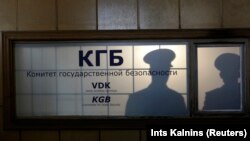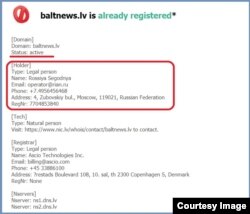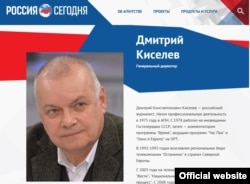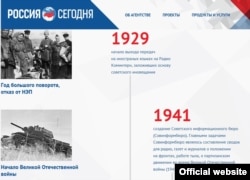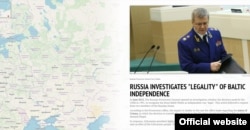On July 24, Russian media reported that the Latvian Foreign Ministry banned the Baltnews.lv news website as part of its implementation of international sanctions against Russia for Moscow’s aggression in Ukraine.
The website for the Baltnews.lv is currently inaccessible.
In response, Russia’s Foreign Ministry accused Latvia of suppressing the free press and claimed Baltnews.lv is an “independent and not controlled by the state media.”
That claim is false.
According to Whois.net, the legal owner of Baltnews.lv is MIA Rossiya Segodnya – the Russian Federation state-owned media conglomerate.
In a written statement sent to Polygraph.info, Latvia’s Foreign Ministry confirmed that Baltnews.lv has been blocked and provided a detailed explanation of the decision.
“Action taken with regard to Baltnews.lv is not related to analysis and review of the information distributed by this agency. Instead this case is examined in the context of supporting and upholding EU sanctions,” the Latvian Foreign Ministry said.
The ministry specified that its decision was part of Latvia’s implementation of EU sanctions against Dmitry Kiselyov, the CEO of MIA Rossiya Segodnya.
Kiselyov was included on the EU sanctions list in 2014 as a “central figure of the government propaganda supporting the deployment of Russian forces in Ukraine.”
The Latvian Foreign Ministry told Polygraph.info that the EU restrictions against Kiselyov “apply also to baltnews.lv, which can be regarded as an economic resource held by a legal person upon which European Union restrictive measures have been imposed and must be upheld.”
MIA Rossiya Segodnya’s “About us” page says the agency was founded in 1929 in the Soviet Union as Radio Comintern.
According to the GlobalSecurity.org website, the Soviet Union’s Comintern (a byname for “The Communist International”) was a “weapon such as no other country possessed, and the Soviet Union never hesitated to use it when the occasion demanded.”
The Comintern’s tools and actions “included pressure groups to influence other countries’ foreign policy in favor of the Soviet Union; attempts to obtain control of the labor movement in other countries, especially key industries such as shipping and radio; enlistment of communists abroad for espionage on behalf of the Soviet Union against their own or other countries,” GlobalSecurity.org stated.
Decades after the Soviet Union’s collapse, the objectives of MIA Rossiya Segodnya differ little from those of its predecessor, Radio Comintern, Paul Goble, a former U.S. government adviser on Eurasian affairs and an expert on Soviet Union and Russia, told Polygraph.info.
The Russian Foreign Ministry’s statement “is not only false, but intended to deceive,” Goble said. “Moscow-controlled media have worked hard to divide Latvia and undermine its democracy. Latvia is only taking reasonable steps to prevent the Russian side from achieving its goals.”
Baltnews.lv was part of a clandestine influence operation Moscow launched in the three Baltic states in 2014, immediately after the Russian annexation of the Crimean peninsula from Ukraine, an in-depth investigation by the Latvian portal Re:Baltica found.
Presenting itself as an “independent” and “non-political” media outlet with a focus on cultural and social topics, Baltnews used specific domain suffixes for each of the Baltic countries -- “.lv” for Latvia, “.ee” for Estonia and “.lt” for Lithuania – and employed a complex domain registration scheme to cover up its true origins and the identity of its owner.
As shown by the Whois.net report cited above, the Baltnews domains have been registered in the Netherlands to a company called Ascio Technologies Inc. That company was also masked under the umbrella of a “European” firm called Media Capital Holding B.V.
MIA Rossiya Segodnya admitted owning the Baltnews project only after Latvian investigative reporters untied all the knots and revealed its true identity.
The Asymmetric Operations Working Group, part of the American Security Project of the Johns Hopkins University’s Applied Physics Laboratory, stated in an unclassified report assessing Russia’s hybrid warfare in the Baltic States that “in regards with the information environment the Baltic States share much with Crimea.”
“Concerns of Russian hybrid warfare may be warranted, whether short or long term, Russian media present a threat not only by spreading inaccurate information and the resulting biased viewpoints but also by calling into question the trustworthiness of all media,” the report stated.
The Institute for the Study of War, in a July 2019 report stated that NATO remains the main target, “the heart” of Russia’s hybrid warfare in the Baltic States.
“The actual expansion of NATO to include the three Baltic States as well as Romania, Bulgaria, Slovakia, and Slovenia in 2004 was likely a tipping point in Putin’s attitudes. The critical nuance to consider is that Putin has always been more concerned about the loss of control over Russia’s perceived sphere of influence than an actual NATO threat to Russia,” the report said.




